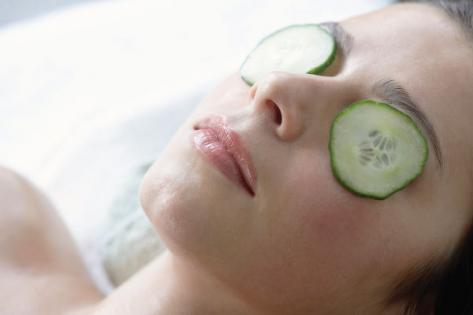Whether it be because of lack of sleep (and see the article on Women and Sleep in Tips & Advice article!), hormonal or a chronic condition, puffy eyes can make you look more tired than you are, as well as stressed and older.
Recommended treatments include cold presses, cucumbers (yes, they work as a short-term solution) and eye cream but the best treatment depends on the cause.
Why does the skin around your eyes get puffy?
Most under-eye or near-eye puffiness is caused by fluid retention.
Because the skin around the eyes is thinner and weaker than on the rest of your face or body, it doesn’t hold retained fluid back from the surface as effectively. That can result in the appearance of puffiness rather than a smooth skin surface. The question then becomes, what is causing you to retain fluid?
Possible causes of fluid retention
There are a number of potential causes for fluid retention that can lead to puffy eyes, including:
Diet: A diet high in salt can lead to increased fluid retention and, subsequently, puffy eyes.
Menses or pregnancy: Hormonal fluctuations caused by the female reproductive cycle can lead to fluid retention and puffy eyes.
Allergies: Allergies and allergic reactions can cause leaks in the capillaries beneath the skin, which then leads to swelling.
Crying: The salt in tears can increase fluid retention just like the salt in your diet does.
There are also a number of medical conditions that can lead to puffiness around the eyes as a side effect. These include: Mononucleosis, Dermatitis, Hyperthyroidism, Periorbital Cellulitis, Chagas Disease, Nephrotic Syndrome, Trichinosis and a Superior Vena Cava Obstruction.
Natural ageing can also cause puffiness
It’s also true that natural ageing can lead to increased puffiness around the eyes. Because the skin around the eyes is already weaker and thinner than on the rest of the face, it’s harder for it to firmly hold back fluid that is retained in the body. As we age, the skin becomes thinner all over our body and face, so the skin around the eyes can become incredibly thin. When this happens, eye puffiness becomes more common and more difficult to control.
Effective ways to treat and minimise puffy eyes
There are both short and long-term ways to treat puffy eyes.
- If your puffy eyes aren’t a chronic condition, then you’ll want to treat your eyes by rehydrating as well as soothing the eyes to minimise any inflammation that may lead to puffiness.
- To rehydrate, combine a topical moisturising eye cream with an intake of fresh fruits and vegetables so that you can eat your water. The molecular structure of water in fruits and vegetables rehydrates you more effectively than drinking a beverage because it is absorbed by your body rather than flushed through your body.
- To reduce inflammation that may be causing puffiness, place something cool over your eyes. This can be professional gel packs, slices of cucumber or just a cool rag. You simply want to calm and eliminate any inflammation that could lead to puffiness.
- For chronic puffiness, you’ll need to work on strengthening your skin. This will also involve both diet changes and topical products from an anti-ageing skin care line. From a diet perspective, you’ll want to focus on an anti-ageing diet that helps to keep skin strong in order to avoid thinning skin. Focus on a diet rich in essential fatty acids, antioxidants and lean proteins.
From a skin care perspective, any anti-wrinkle eye cream that’s worth its money effectively works to strengthen skin by boosting collagen and elastin strength. Just remember that you don’t want to use the same anti-wrinkle treatment that you use on the rest of your face on your eyes. Your eye treatment should be formulated to be sensitive to the thinner, weaker skin around your eyes.
* * *
Would you like some tips on recommended products? If so, let us konw and Mirella will help!


















__small.png)










